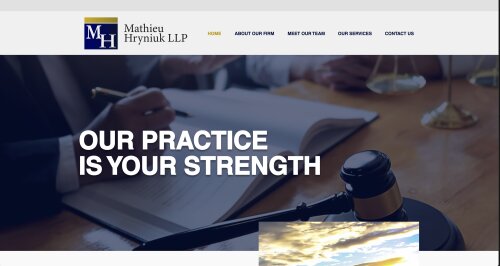Best Accounting & Auditing Lawyers in Canada
Share your needs with us, get contacted by law firms.
Free. Takes 2 min.
Or refine your search by selecting a city:
List of the best lawyers in Canada
About Accounting & Auditing Law in Canada
Accounting and auditing in Canada are crucial components of the country's financial framework, ensuring transparency, accuracy, and compliance in financial reporting. Canadian laws and standards governing accounting and auditing practices are designed to protect stakeholders, including business owners, investors, and the public, by fostering fair financial disclosure and accountability. Canada follows International Financial Reporting Standards (IFRS) for public companies and Accounting Standards for Private Enterprises (ASPE) for private entities. Additionally, the audit profession is regulated by various provincial institutes, guided by principles set by organizations like the Canadian Auditing and Assurance Standards Board (AASB).
Why You May Need a Lawyer
There are several situations in which individuals or businesses might require legal assistance relating to accounting and auditing in Canada:
- Compliance Issues: Navigating complex accounting regulations and ensuring your business complies with all applicable laws can be challenging.
- Financial Disputes: Disagreements involving financial reports, audits, or interpretations of financial data may require legal intervention.
- Fraud Investigations: Suspected fraud in financial statements or auditing processes necessitates legal and forensic investigation.
- Mergers & Acquisitions: During these transactions, accurate financial reporting and thorough audits are essential for due diligence.
- Government Investigations: Legal assistance can help manage investigations or audits conducted by taxing authorities or governmental bodies.
Local Laws Overview
The legal framework for accounting and auditing in Canada is governed by both federal and provincial regulations. Key aspects include:
- International Financial Reporting Standards (IFRS): Mandatory for publicly accountable enterprises, these standards ensure consistency in financial reporting.
- Accounting Standards for Private Enterprises (ASPE): Tailored for Canadian private companies, offering more lenient and flexible financial reporting rules.
- Canadian Standards on Quality Control (CSQC): These standards require accounting firms to establish a quality control system for audits.
- Provincial Regulatory Bodies: Each province has its own institute, such as CPA Ontario, regulating the accounting profession within its jurisdiction.
Frequently Asked Questions
What types of entities are required to have their financial statements audited?
Publicly accountable companies and certain private entities, as per their governing documents or shareholders' requests, must have audits conducted on their financial statements.
What is the role of the Canadian Auditing and Assurance Standards Board (AASB)?
The AASB sets the standards for auditing, assurance, and related services in Canada, aiming for high-quality, consistent practices across the profession.
Can a private enterprise switch from ASPE to IFRS?
Yes, a private enterprise can voluntarily switch to IFRS if it decides to become publicly accountable or for other strategic reasons, though it must comply fully once the change is implemented.
Are there penalties for non-compliance with accounting standards?
Yes, non-compliance can result in financial penalties, legal consequences, and reputational damage, and discrepancies may trigger investigations by regulatory bodies.
What is the importance of internal audits?
Internal audits provide ongoing evaluations of a company's financial and operational practices, helping to improve governance, risk management, and control processes.
Who sets the ethical standards for accountants in Canada?
The Provincial CPA bodies establish ethical standards, ensuring accountants adhere to the principles of integrity, objectivity, and professionalism.
What are the key differences between review and audit engagements?
An audit provides a higher level of assurance, involving comprehensive procedures to verify financial statements, while a review is less extensive and provides limited assurance.
How often should a business conduct a financial audit?
This depends on the entity type and regulatory requirements; publicly accountable companies require annual audits, while private companies may have different stipulations.
What is forensic accounting?
Forensic accounting involves the use of accounting expertise to investigate fraud, financial disputes, or litigation support, often leading to legal proceedings.
How can technology impact accounting practices in Canada?
Technological advancements, such as AI and blockchain, are transforming accounting practices by enhancing accuracy, efficiency, and offering real-time data analysis capabilities.
Additional Resources
Here are some valuable resources and organizations for individuals seeking guidance in accounting and auditing matters in Canada:
- Chartered Professional Accountants of Canada (CPA Canada)
- The Office of the Auditor General of Canada
- Canadian Auditing and Assurance Standards Board (AASB)
- Institute of Internal Auditors (IIA) - Canada
- Canadian Securities Administrators (CSA)
Next Steps
If you need legal assistance concerning accounting and auditing in Canada, consider the following steps:
- Identify and outline your legal concerns or the accounting/auditing issues you face.
- Consult with a lawyer specializing in accounting and auditing law in your region.
- Prepare pertinent documents and financial records for your legal advisor to review.
- Explore mediation or professional dispute resolution options if issues arise with auditors or accountants.
- Stay informed about any changes to relevant accounting and auditing standards and laws affecting your business or organization.
Lawzana helps you find the best lawyers and law firms in Canada through a curated and pre-screened list of qualified legal professionals. Our platform offers rankings and detailed profiles of attorneys and law firms, allowing you to compare based on practice areas, including Accounting & Auditing, experience, and client feedback.
Each profile includes a description of the firm's areas of practice, client reviews, team members and partners, year of establishment, spoken languages, office locations, contact information, social media presence, and any published articles or resources. Most firms on our platform speak English and are experienced in both local and international legal matters.
Get a quote from top-rated law firms in Canada — quickly, securely, and without unnecessary hassle.
Disclaimer:
The information provided on this page is for general informational purposes only and does not constitute legal advice. While we strive to ensure the accuracy and relevance of the content, legal information may change over time, and interpretations of the law can vary. You should always consult with a qualified legal professional for advice specific to your situation.
We disclaim all liability for actions taken or not taken based on the content of this page. If you believe any information is incorrect or outdated, please contact us, and we will review and update it where appropriate.
Browse accounting & auditing law firms by city in Canada
Refine your search by selecting a city.












